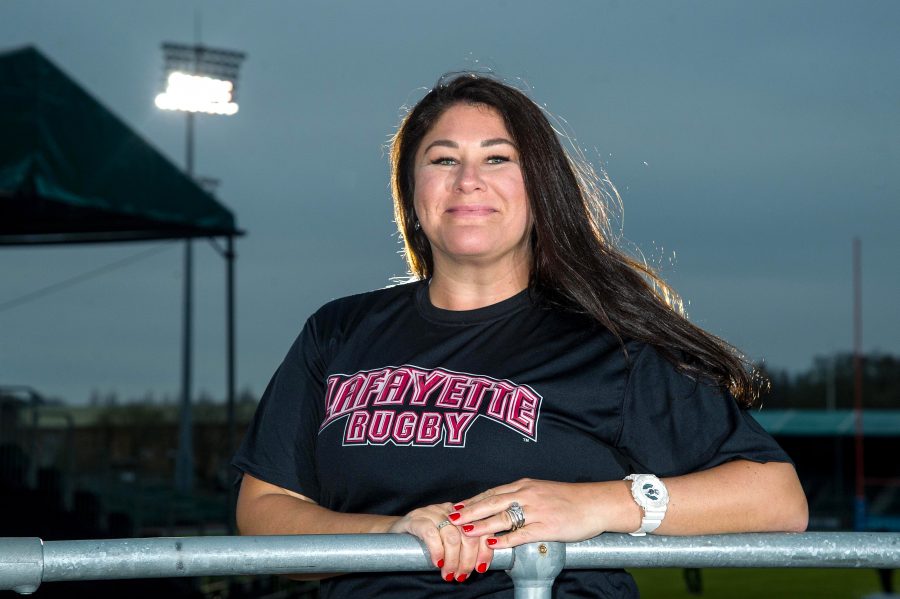In 2002, Rachel Grispon started playing rugby—the sport that has since defined her dreams and life goals.
Now Lafayette’s women’s club rugby head coach, Grispon began playing in high school before attending East Stroudsburg University, where she continued playing rugby while working towards a degree in sports management. Four years after, she was introduced as Lafayette’s coach.
“I’m not going to say it was easy,” she said. “It was definitely kind of tough, because I’d personally never coached before. So there was a mental and physical change that I had to go through.”
“The [players] were accepting but still gave me that tough love, but I appreciated it,” she added.
Although a tough start, Grispon said she’s learned a lot from her athletes over the years, including not judging players based solely on physical characteristics.
“I think a valuable lesson I’ve learned is to not assume, and that everyone has a sleeping Leopard in them,” Grispon said. “It obviously resonates with Lafayette’s mascot, but you don’t have to be the strongest individual on the team to be an asset. And as a coach you can’t assume that those not as physically strong are not back end strong, especially if they have a work ethic that helps drive the team and get things done.”
Seven years after becoming the coach, Grispon was selected as a winner of the Premier Rugby Scholarship.
Along with 29 other coaches from across the country, Grispon traveled to England to take part in a weeklong immersive professional development experience. The initiative behind the program is run by the Premier League in hopes of using “rugby as a tool for social change, covering all methodologies used in these life changing initiatives,” according to their website.
While there, she worked alongside national team players and coaches learning an array of coaching techniques and theories that could be brought back home and immersed into her local rugby community.
About 3,500 miles away, Grispon engrossed herself in many activities and programs. Part of the trip included taking courses to increase the coaches’ level of certification, going through different modules each day that focused on the principles and values of rugby and coaching.
Within these modules Grispon was able to reflect on her coaching style while enhancing her skills. Although normally confident, Grispon said she was nervous when she had to coach the Olympic team, reminding herself to “overcome that confidence, figure it out, and get it done.”
When she wasn’t working through these modules, Grispon said she was able to enjoy her free time traveling and visiting the birthplace of the Rugby Premier League. She was able to visit three of the twelve premier league teams, while also traveling to the London Olympic Stadium to watch two highly competitive professional games, played by two of the leading teams in the league, the Harlequins and Saracens.
“It was great because I really took a step back and took it all in as a sponge,” she said. “Now I can build up not only my own team, but the 12 other teams in the conference and try to help adapt the coaching as well.”
With the motivation and enthusiasm she felt coming home, Grispon said she has already been utilizing some tools and exercises with the women’s club rugby team.
“What I came back with was a drive to not so much as reinvent the wheel, but to redevelop our team where we are able to take ownership of it and to have more of a drive behind it,” Grispon said.
“Our first practice [back] was very emotional for the [team]. I took the ball and I asked them what it meant to them,” she described. “There were some tears from me, because we were just so involved and we appreciated the sport so much, but we hadn’t realized how much it meant to us.”
Grispon said she continually reminds her team that every player is an opportunity for this team to excel down the line and into the future. Her hope is to encourage women to continue to grow based off the lessons they learned from the sport and program, and to ultimately continue to inspire women’s lives.
“We [as coaches] stay on the field with you, and with you means we support you and there’s always going to be someone there behind you, regardless of if you can see them or not,” she said. “You can feel them and hear them, and that resonates with you not only on the pitch, but also off of the pitch.”
Andrew Hollander ’21 contributed reporting.





















































































































